Skiing like this any more:

Skiing like this any more:

I picked this up from a note at the end of John Naughton’s column in the Observer this week. It’s an entertaining keynote address that gives a good lay introduction to the issues AI raises – or, more accurately, ought to raise. Worth watching – if only for sage advice about what to look for when you buy your next internet connected dog bowl or door alarm…
As we fidget on the edge of Autumn and the resumption of what passes for political life in this country this is a thoughtful piece from John Harris about centrism, the damaging rush to ideological purity across the political spectrum and the reasons why politics seems both detached from reality and utterly unable to deal with it:
One big tension defines where British politics has arrived. On both sides, there are a lot of people – from no-deal Brexiteers to the Corbyn hardcore – who seem to think that they are the custodians of their own variety of purity. What we are perhaps discovering is that this mindset may actually deliver the reverse: a polluted politics in which even people in positions of power keep very questionable company, debate tends to look like an indecipherable mess, and the biggest casualty is a national conversation that feels in any way useful.
— Read on www.theguardian.com/commentisfree/2018/aug/27/centrist-path-hardcore-brexiteers-corbynites
Been discovering the music of Tim Garland, starting with his new piece Weather Walker. I find good, longer and more symphonic jazz pieces involving and very satisfying:
He does simple very nicely too:
It’s hard, if you aren’t in the swim of it, to know where to find new ‘classical’ music (does that even mean anything any more?) I get updates from the wonderful NMC, and follow hints and tips from occasional magazines and newsletters, but it’s all a bit haphazard. Which makes it a special joy to come across a new (to me) distributor. Another Timbre is based in Sheffield and looks really interesting. I came across them in a Guardian review of a new recording by a Canadian composer called Cassandra Miller. Have a listen to part of one of her pieces:
There are more samples on her site.
The article mentioned another composer from the same series, Linda Caitlin Smith.
Here’s one of her pieces:
Find her here
This is the cover picture they didn’t choose for all those no deal Brexit reports.

Picture stolen shamelessly from a tweet by @richard_littler

I am always in awe of the Enlightened Economist – the breadth of her reading and the depth of her response to these detailed, complex books about economics, summed up in pithy insightful comments.
I’ve just read her comments on a book that – I think – is just about to be published – Caitlin Rosenthal’s Accounting for Slavery: Masters and Management and found them fascinating.
Rosenthal looks at the business of running plantations with slave labour and finds that, well before factories were of any comparable size absent owners, resident managers, banks and markets were developing systems of management to deal with these large international operations.
Of course at the base of the pyramid you have the horror of slavery where human capital is just that, an asset to the business with a cash value. It’s chilling, but it’s what businesses, bureaucracies, governments do all the time. As we globalise, and resist it, as we wait for the rising tide of AI to wash over us, Rosenthal’s warning, quoted in the review seems very timely:
Rosenthal (formerly a management consultant) ends by pointing out that labor conditions for many people in the world still leave much to be desired: “Confronting plantation account books can remind us how easy it is to overlook the conditions of production from the comfort of a counting house or safety of a computer screen. Reckoning with the ways planters accounted for slavery should encourage us to rethink the kinds of data we record and how we use it. Quantitative records can help us to see farther, but only if we remember what the numbers make visible and what they erase.”
— Read on www.enlightenmenteconomics.com/blog/index.php/2018/08/what-numbers-make-visible-what-they-erase/

Biblioklept has published a lovely eulogy to Tom Clark – who was killed a few days ago.
With reading as an introduction to his work if you didn’t know him (I didn’t).
via RIP Tom Clark
I love the way the evenings lengthen in August. The first hint of cold in the air. I felt it tonight, nose slightly damp ( like a dog’s nose must?)
It made me think of days like these, although I don’t long for them yet.
